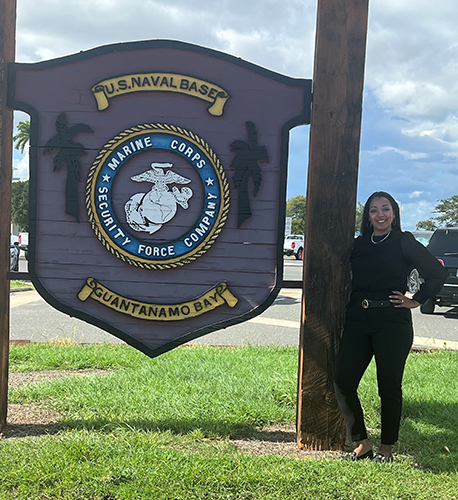Recently returning from a life-changing trip to Guantánamo Bay, Cuba, law student Kathryn Tucker has been inspired to make strides in human rights and international law. Tucker is a non-traditional law student juggling her full-time career, being a part-time law student, wife, mother, and an active member of her community.
Due to her passion for helping others, Tucker decided to pursue law school despite already having a career underway. “I’m just obsessed with the world and finding what I can do to make it a better place,” she said.

Returning from a life-changing trip to Guantánamo Bay in Cuba, law student Kathryn Tucker has been inspired to make strides in human rights and international law.
Prior to becoming a law student, Tucker knew about the unique opportunity to travel to Guantánamo Bay as a student through the Non-Governmental Organization (NGO) Observers program by the Office of Military Commissions. She learned about the opportunity through her mentor, Patty Wise, a UToledo alumna from the class of 1985, and an information session hosted by the College of Law where past students who participated shared their experiences.
UToledo Law student participation as NGO Observers at Guantánamo Bay was initiated by Professor of Law Emeritus Benjamin Davis in 2012. The experience is highly valuable to law students interested in human rights and international law and offers the opportunity for participants to witness high-profile and history-making trials.
On Tucker’s trip, she observed the 48th pretrial hearing for detainees accused of involvement in the 9/11 attacks. The defendants, accused of assisting the 19 hijackers responsible for the 9/11 attacks, faced classified or national security restrictions that contributed to the prolonged nature of the cases. After more than 20 years following the attacks, 30 of the initial 780 detainees are still held at the detention center awaiting trial.
Tucker observed The Khalid Sheikh Mohammed (KSM) trials which included four co-conspirators. The trials showcased the complexity of the cases involving various government agencies including the FBI, CIA and other agencies.
Since Guantánamo Bay operates outside U.S. laws, detainees have no constitutional rights, raising significant human rights concerns. One of the accused, Ramzi Bin al Shibh, was unable to stand trial due to psychological issues and alleged torture.
“This marked a historic moment because the Geneva Convention has not previously applied to 9/11 detainees,” Tucker said. “It is expected to rehabilitate victims of torture.”
Prior to the trip, Tucker researched the detainees and anything she could find about their cases. She read about their alleged torture while imprisoned at CIA black sites. “I’m not sure what I expected to see,” she said. “I thought they would look lifeless, given the conditions of their detainment the past two decades.”
Reminiscing on her experience, Tucker shared, “When the detainees were escorted into the courtroom, they were dressed in their cultural attire and seemed genuinely happy to see their legal team. The detainees were also able to speak to one another while in the courtroom. As I saw the detainees enjoying the company of their attorneys, I felt solaced by their smiles. While in that moment, I also heard family members of the victims crying in the gallery. It was difficult for me to maintain my composure and I was confused by the existence of all these conflicting emotions. How do you have feelings of empathy for the defense but also sadness for the family members? Seeing the victims’ families was one of the hardest parts. It’s complicated to navigate those feelings.”
Tucker had the opportunity to speak directly with Bin al Shibh’s attorney. “It was a fascinating and invaluable experience that added depth to my understanding of the proceedings,” she said. She remains in contact with him today.
In the wake of her observations and experience, Tucker gained direction for how she wants to contribute to improving the country through her legal career, emphasizing the crucial role lawyers play in maintaining a fair, just and equitable legal system. Now, she aims to research domestic and international methods for rehabilitating victims of torture, recognizing the scarcity of case law on the subject.
Through her transformative experience, Tucker has been left with a lot to unpack, personally and professionally.
“I look at life differently now,” she said. Tucker said she hopes more law students continue to participate in this program, raising awareness and contributing to fair and transparent justice.